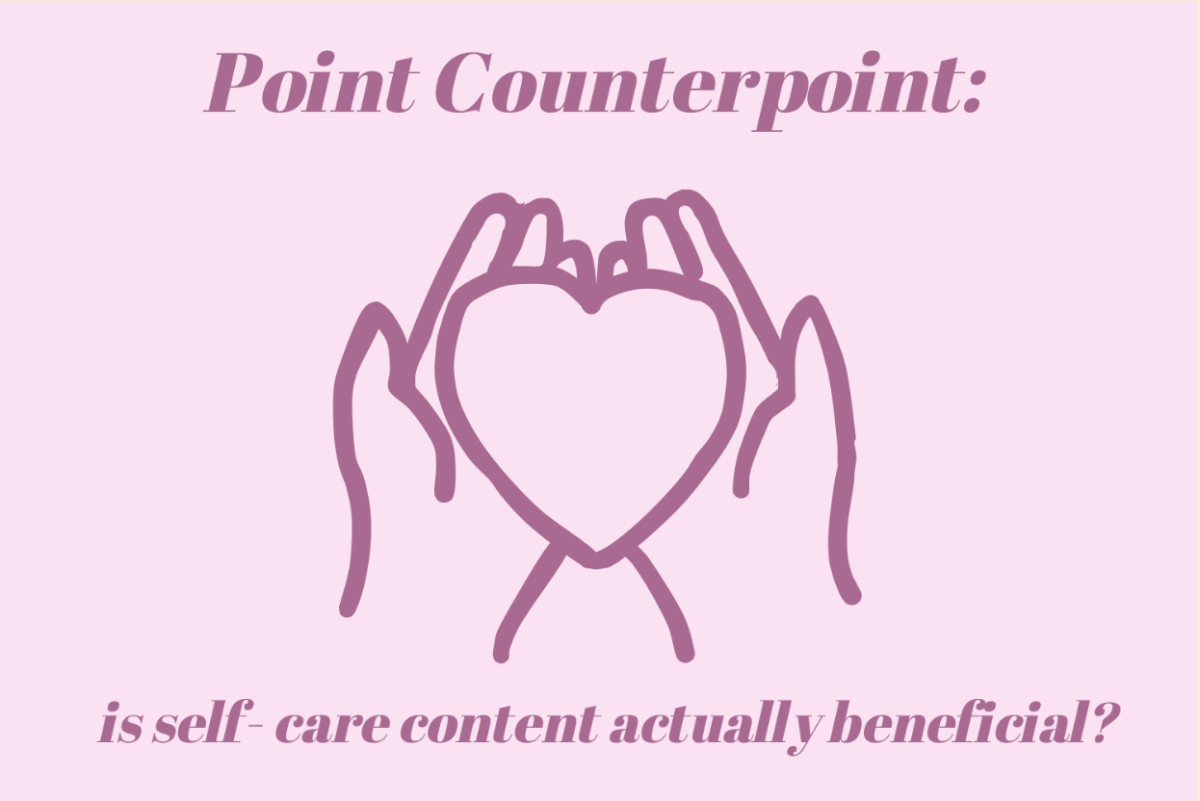A wave of trends branded as new forms of “self-care” have swept the internet in recent years. This social media trend has manifested in TikToks featuring skin care products, bloggers encouraging their followers to “put themselves first” and posts listing self-affirmations. However, differing opinions have emerged over whether or not this influx of “self-care” content is actually beneficial to its viewers.
Beneficial – Audrey
Social pressures, self-comparison and the insecurities ingrained in everyday life are only magnified by the growing prevalence of social media. Unfortunately, ideals such as self-love and positive encouragement that create supportive environments are often diminished by personal insecurities stimulated by social media platforms such as Instagram and TikTok.
Online platforms have become echo chambers that foster mental health struggles and insecurities for their users. Intended to encourage people to prioritize their emotional health, self-care content balances out the negative aspects of social media by battling insecurities and social pressure.
Recently, countless self-care videos have overwhelmed my TikTok For You Page with phrases like “you are your top priority.” While this idea may originally be deemed as self-absorbed, it spreads a positive impact to the people who struggle to stand up for themselves and their own needs.
Influencers who promote the concept of “putting yourself first” are encouraging their viewers to focus primarily on their own desires. By interpreting this quote as self-centered, users are diminishing its purpose, which is to ensure that people prioritize taking their own needs into consideration, not just those of others.
Furthermore, self-care content generally involves positive affirmation. This content inspires self-confidence by encouraging people to find love within themselves. While some might consider this to be egocentric, it speaks volumes to those who struggle with insecurities and low self-esteem, balancing out the negative aspects of social media.
Everyone struggles with insecurities, making self-care content beneficial for all its viewers. While some people’s mental challenges might not be as apparent as other’s, self-love is a practice that can benefit everyone’s wellbeing.
By encouraging a culture of self-love, influencers are automatically contributing to a more positive online community. Users who begin to internalize self-care messages will reflect a more positive mindset on other social media content they consume. For example, videos that could prompt feelings of insecurity will instead be received positively by their viewers.
Therefore, the growing amount of self-care content is beneficial to users as its positive proclamations create a more supportive relationship between social media and ourselves.
Not Beneficial – Yasmine
Every time I scroll through my TikTok For You Page, I am met with an influx of wellness influencers preaching “you don’t owe anyone anything.” While I initially found that mantra empowering, I realized that it exemplifies the isolating narrative that runs rampant online. Social media self-care content has morphed into an environment that drives an individualistic mindset.
Individualism is the philosophy of valuing personal beliefs, autonomy and self-interests over the interests of the surrounding community. It lies at the heart of a significant portion of self-care content as influencers are emphasizing the message that you should be your only priority.
By promoting the idea that our only interests should be our own, self-care content creates a dangerous culture of apathy. Caring for yourself is important, but not at the full expense of others. There is a stark difference between self-care and selfishness, and many mindsets that are being excused as “self-care” blur the line between the two.
According to Wellbeing People, a lack of connection to others leads to higher levels of anxiety and depression. In order to truly practice self-care, we must exercise care towards others.
Promoting self-love and self-respect should not mean neglecting the feelings of others. Prioritizing your own wellbeing does not mean ignoring the wellbeing of others. It’s essential for us to cultivate communities both online and in person where people feel supported.
While we navigate our everyday lives, it is easy to lose sight of the small things others do for us. However, these acts of kindness are instrumental in improving our moods or making our lives easier. Furthermore, according to the Mental Health Foundation, living altruistic lives directly benefits our mental health by improving our self-perception. Without these acts of kindness, our lives would be much lonelier. Often, these small acts are done without expecting anything in return.
The individualistic mindset promoted by self-care content drives the idea that these small acts should only be done if they benefit you. Not every interaction should be thought of as a transaction. We owe each other a baseline of compassion without expecting anything in return.
Although self-care might have emerged as a genuine wellness practice, its persistence online has transformed the practice to a philosophy that drives isolation. This culture ultimately harms users. It is essential for us to cultivate equally healthy relationships with ourselves and our communities.
Add a heading by yasmine_rivera











